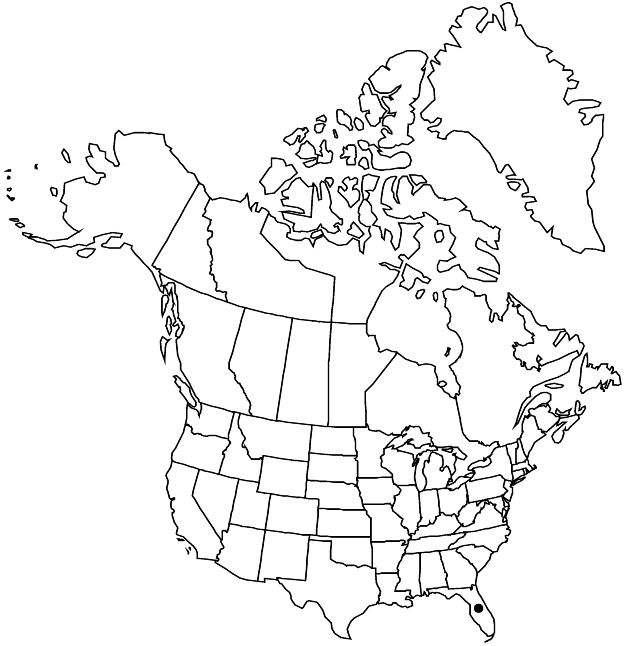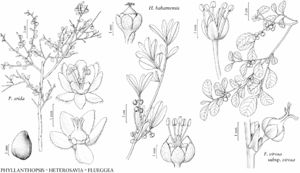Difference between revisions of "Flueggea virosa subsp. virosa"
FNA>Volume Importer |
imported>Volume Importer |
||
| (5 intermediate revisions by 2 users not shown) | |||
| Line 1: | Line 1: | ||
{{Treatment/ID | {{Treatment/ID | ||
|accepted_name=Flueggea virosa subsp. virosa | |accepted_name=Flueggea virosa subsp. virosa | ||
| − | |accepted_authority= | + | |accepted_authority= |
|publications= | |publications= | ||
|special_status={{Treatment/ID/Special_status | |special_status={{Treatment/ID/Special_status | ||
| Line 8: | Line 8: | ||
}}{{Treatment/ID/Special_status | }}{{Treatment/ID/Special_status | ||
|code=F | |code=F | ||
| − | |label= | + | |label=Illustrated |
}} | }} | ||
|basionyms= | |basionyms= | ||
| Line 26: | Line 26: | ||
|elevation=0–10 m. | |elevation=0–10 m. | ||
|distribution=Fla.;Asia;Africa;Pacific Islands (Malesia except New Guinea). | |distribution=Fla.;Asia;Africa;Pacific Islands (Malesia except New Guinea). | ||
| + | |introduced=true | ||
|discussion=<p>Subspecies virosa is sometimes cultivated as an ornamental and has become naturalized in Miami-Dade County, where it was first reported escaping in the 1970s. It has weedy tendencies in its native range. The roots, and to a lesser extent the twigs and leaves, are used medicinally in Africa to treat a wide variety of maladies, and the fruits are eaten fresh or made into an alcoholic beverage (J. R. S. Tabuti 2008). The other subspecies grow from northeast India to Myanmar (subsp. himalaica D. G. Long) and New Guinea and Australia [subsp. melanthesoides (F. Mueller) G. L. Webster].</p> | |discussion=<p>Subspecies virosa is sometimes cultivated as an ornamental and has become naturalized in Miami-Dade County, where it was first reported escaping in the 1970s. It has weedy tendencies in its native range. The roots, and to a lesser extent the twigs and leaves, are used medicinally in Africa to treat a wide variety of maladies, and the fruits are eaten fresh or made into an alcoholic beverage (J. R. S. Tabuti 2008). The other subspecies grow from northeast India to Myanmar (subsp. himalaica D. G. Long) and New Guinea and Australia [subsp. melanthesoides (F. Mueller) G. L. Webster].</p> | ||
|tables= | |tables= | ||
| Line 35: | Line 36: | ||
-->{{#Taxon: | -->{{#Taxon: | ||
name=Flueggea virosa subsp. virosa | name=Flueggea virosa subsp. virosa | ||
| − | + | |authority= | |
| − | |authority= | ||
|rank=subspecies | |rank=subspecies | ||
|parent rank=species | |parent rank=species | ||
| Line 50: | Line 50: | ||
|publication title= | |publication title= | ||
|publication year= | |publication year= | ||
| − | |special status=Introduced; | + | |special status=Introduced;Illustrated |
| − | |source xml=https:// | + | |source xml=https://bitbucket.org/aafc-mbb/fna-data-curation/src/2e0870ddd59836b60bcf96646a41e87ea5a5943a/coarse_grained_fna_xml/V12/V12_598.xml |
|genus=Flueggea | |genus=Flueggea | ||
|species=Flueggea virosa | |species=Flueggea virosa | ||
Latest revision as of 19:16, 5 November 2020
Shrubs, 10–60 dm. Stems sharply angled when young. Leaves: petiole 2–9 mm; blade elliptic to obovate, 2–5 × 1–3 cm, base acute-cuneate, apex rounded to acute. Inflorescences: staminate 20–40-flowered, pistillate 3–10-flowered. Pedicels: staminate 3–6 mm, pistillate 1.5–5(–12) mm. Staminate flowers: sepals ovate to elliptic, 0.8–1.5 mm; pistillode 1.2–2.2 mm, nearly as long as stamens. Pistillate flowers: sepals ovate to elliptic, 0.7–1 mm. Berries white, 3–5 mm diam. Seeds brown, 1.7–2.4(–3) mm. 2n = 26 (Africa, Asia).
Phenology: Flowering and fruiting summer.
Habitat: Disturbed rocky pinelands.
Elevation: 0–10 m.
Distribution

Introduced; Fla., Asia, Africa, Pacific Islands (Malesia except New Guinea).
Discussion
Subspecies virosa is sometimes cultivated as an ornamental and has become naturalized in Miami-Dade County, where it was first reported escaping in the 1970s. It has weedy tendencies in its native range. The roots, and to a lesser extent the twigs and leaves, are used medicinally in Africa to treat a wide variety of maladies, and the fruits are eaten fresh or made into an alcoholic beverage (J. R. S. Tabuti 2008). The other subspecies grow from northeast India to Myanmar (subsp. himalaica D. G. Long) and New Guinea and Australia [subsp. melanthesoides (F. Mueller) G. L. Webster].
Selected References
None.
